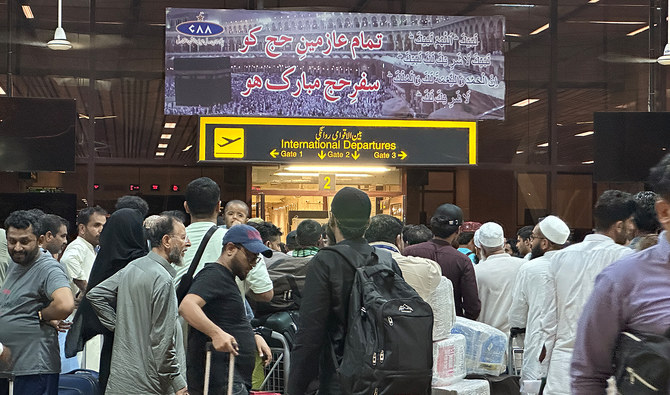KARACHI: Pakistan launched its Hajj flight operation on Thursday, with two private airlines departing from Karachi’s Jinnah International Airport, marking the start of a month-long special air service to transport pilgrims to Saudi Arabia under the Makkah Route Initiative.
The initiative, launched by Saudi authorities in collaboration with several Muslim-majority countries, enables pilgrims to complete the immigration process in their home country, allowing them to bypass these procedures upon arrival in the kingdom.
Pakistan joined the initiative in 2019 as part of a pilot program that started in Islamabad. Its success led to plans for the program’s expansion to other cities, with pilgrims from Karachi benefitting from it for the first time this year.
The first Airblue flight carrying 180 pilgrims departed at approximately 2:18 AM, while the second, operated by Air Sial with about 155 pilgrims onboard, left at around 2:45 AM from Karachi.
“Alhamdulillah, our first Hajj Flight PF754 departed a while ago from Karachi to Madinah which marks the commencement of our Hajj Operation 2024,” AirSial proclaimed in a social media post.
Earlier this week, a group of 44 Saudi officials arrived in Karachi to carry out immigration procedures under the Makkah Route Initiative for Hajj pilgrims.
As part of the month-long pre-Hajj operations starting this week, 11 flights will arrive in Madinah on Thursday from five major Pakistani cities, transporting about 2,160 pilgrims.
Pilgrims from Islamabad, Karachi, Lahore, Multan and Peshawar will be flown to Prince Mohammad Bin Abdulaziz International Airport in Madinah, marking a significant influx of devotees.
Five airlines – Pakistan International Airlines, Saudi Airlines, Airblue, Serene Air and Air Sial – will operate 259 flights to ferry pilgrims from eight major cities in Pakistan, including Islamabad, Karachi, Lahore, Peshawar, Multan, Quetta, Sialkot and Sukkur, to Jeddah and Madinah under the government scheme.
Upon arrival, Pakistani pilgrims will be received by officials at the Pakistan Consulate General and the Hajj Mission of the Ministry of Religious Affairs.
For the first 15 days, all flights will depart from various Pakistani cities to Madinah, continuing until May 23. Thereafter, flights will switch to King Abdulaziz International Airport in Jeddah until the completion of the pre-Hajj operation.
This year, around 179,210 Pakistanis will perform Hajj under both government and private schemes.
Hajj, one of the five pillars of Islam, requires every adult Muslim who is financially and physically able to undertake at least once in their lifetime a pilgrimage to the holy Islamic sites in Makkah and Madinah.
















